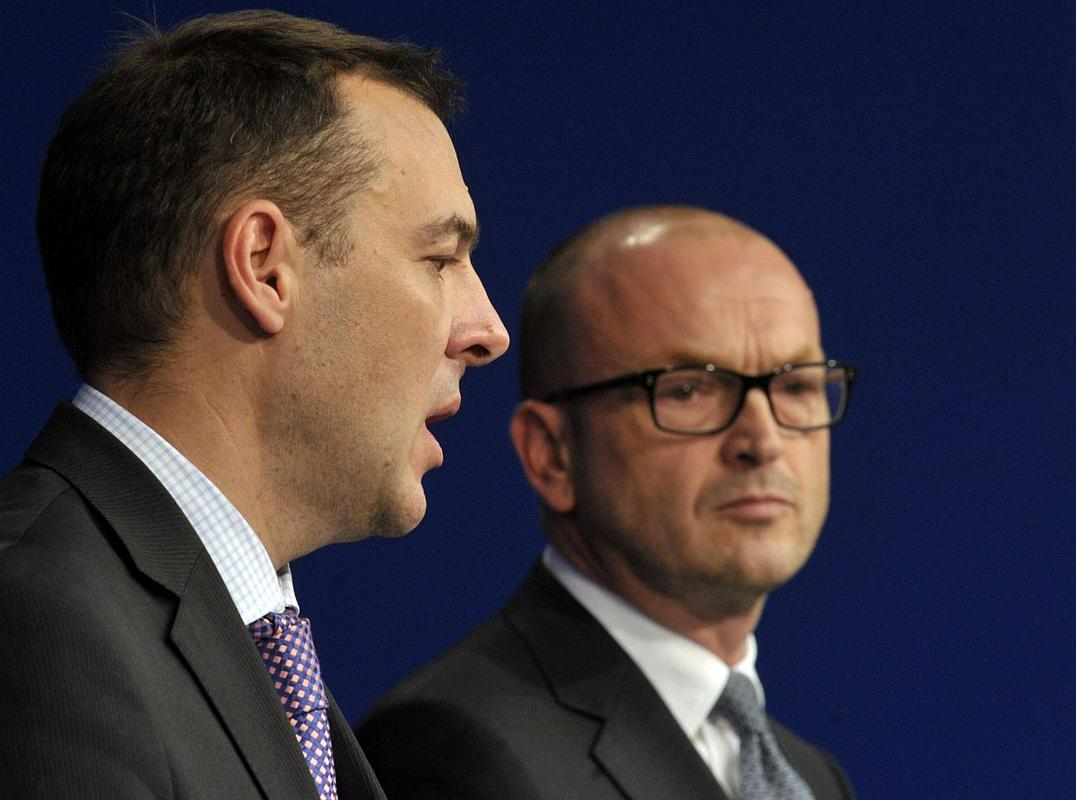Today it is clear that Slovenia can proceed with the repair of its financial sector without turning to her European partners for financial assistance.
Banks in Slovenia are saddled with an estimated 7.9 billion euros in bad loans - equivalent to a fifth of national output - after the global economic slowdown exposed their poor lending practices and tangled ownership structure.
At stake in Slovenia is whether the euro zone as a whole can say with confidence it is emerging from the convulsions of the past five years, or whether it still risks slipping back into the kind of crises that hit Greece, Ireland and Cyprus.
Unveiling the results of an external assessment of how much of the banks' lending has gone sour, central bank governor Boštjan Jazbec said the three biggest Slovenian banks needed 3 billion euros in re-capitalisation. The three will get 2.1 billion euros in cash, will raise another 441 million euros from imposing losses on junior bondholders, and will get about 905 million euros of government guaranteed bonds, according to documents published by the government. Five smaller banks would be given until June 2014 to raise 1.1 billion euros from private capital.
The lion's share of Slovenia's bad debt is held by the big three state banks, who together admitted to losses of close to 390 million euros in the first nine months of 2013 and have some of the poorest capital ratios in Europe. The banking problems represent a dramatic fall from grace for Slovenia, an ex-Yugoslav country that for years was viewed as a haven of stability and economic health.
The government has already received parliamentary approval to recapitalise the banks by up to 4.7 billion euros. The government plans to ring-fence up to 4 billion in a 'bad bank', leaving healthy banks that would be easier to sell. It needs EU approval to begin the transfer of loans.
Even if Slovenia can avert a calamity now, economists say it will face a drawn-out crisis as it remakes its economy to take account of the new, harsher economic realities. It will have to conduct a fire sale of assets still owned by the state, including banks, telecoms, supermarkets and newspapers. It may also have to scrap some of its generous social protections, such as a rule requiring employers to give workers an allowance for lunch.
Borrowing costs down
The European Union was reassured. "Today it is clear that Slovenia can proceed with the repair of its financial sector without turning to her European partners for financial assistance," EU Economic and Monetary Affairs Commissioner Olli Rehn said in a statement.
The cost of Slovenia's government borrowing fell close to nine-month lows on Thursday after announcement of the stress test results.
But the state remains in control of around half the economy, through a tangled web of ownership that often goes back to the biggest banks. Politically-motivated lending was rife. Deleveraging the banks could send further shockwaves through the economy, with unemployment already over 12 percent.
The crisis represents a dramatic fall from grace for Slovenia, an ex-Yugoslav republic of 2 million people that for years was viewed as a haven of stability and economic health. While the rest of Yugoslavia imploded in war in the 1990s, Slovenia took a fast-track to membership of the EU in 2004 and the euro zone in 2007. Exports of cars, kitchen appliances and pharmaceuticals made it the currency bloc's fastest growing economy that year.
Crony capitalism
The government had already received parliamentary approval to recapitalise the banks by up to 4.7 billion euros. It now plans to ring-fence around 4 billion in a 'bad bank', leaving healthy banks that would be easier to sell. It needs EU approval to begin the transfer of loans.
The measures will take Slovenia's general government level to 75.6 percent of gross domestic product (GDP).
A fire sale of national assets once considered sacrosanct is set to ensue. They include No. 2 lender Nova KBM, Telekom Slovenia, flag carrier Adria Airways and Ljubljana international airport. The government may also have to scrap some of its generous social protections, such as a rule requiring employers to give workers an allowance for lunch, having already raised the retirement age and cut public sector wages.
"This is a credible number, and the market will be relieved that it is on the table now, and realistic," Timothy Ash, head of emerging markets research at Standard Bank said of the stress test results.
But Christmas lights and mulled wine in the capital, Ljubljana, could not mask the gloom.
"I don't see any opportunity for progress here," said 25-year-old Jure Martinec, a graphic design student. "People are just trying to get by," he said.
Lamenting the cost of crony capitalism, he added: "We're so small that everyone knows each other, everything works through connections, and I don't see anyone trying to change it."
Today it is clear that Slovenia can proceed with the repair of its financial sector without turning to her European partners for financial assistance.



































































